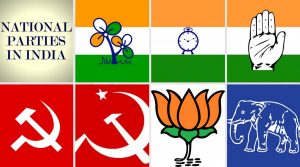Election Commission Decides On Party Symbols:

The Election Commission of India (ECI) has frozen the ‘Bungalow’ election symbol of the Lok Janshakti Party (LJP), so that neither of the two factions of the party will be able to use it in the coming Assembly byelections for the Kusheshwar Asthan and Tarapur seats in Bihar.
- This is not something new. Over the last few years, two other prominent cases of parties splitting, followed by a tussle over the election symbol, have been seen with regard to the Samajwadi Party (Cycle) and the AIADMK (Two leaves) in 2017.
As per the guidelines, to get a symbol allotted:
- A party/candidate has to provide a list of three symbols from the EC’s free symbols list at the time of filing nomination papers.
- Among them, one symbol is allotted to the party/candidate on a first-come-first-serve basis.
- When a recognised political party splits, the Election Commission takes the decision on assigning the symbol.
Powers of Election Commission:
- The Election Symbols (Reservation and Allotment) Order, 1968 empowers the EC to recognise political parties and allot symbols.
- Under Paragraph 15 of the Order, it can decide disputes among rival groups or sections of a recognised political party staking claim to its name and symbol.
- The EC is also the only authority to decide issues on a dispute or a merger. The Supreme Court upheld its validity in Sadiq Ali and another vs. ECI in 1971.
As per the Election Symbols (Reservation and Allotment) (Amendment) Order, 2017, party symbols are either:
- Reserved: Eight national parties and 64 state parties across the country have “reserved” symbols.
- Free: The Election Commission also has a pool of nearly 200 “free” symbols that are allotted to the thousands of unrecognised regional parties that pop up before elections.
- On the question of a split in a political party outside the legislature, Para 15 of the Symbols Order, 1968, states:
- “When the Commission is satisfied that there are rival sections or groups of a recognised political party each of whom claims to be that party the Commission may decide that one such rival section or group or none of such rival sections or groups is that recognised political party and the decision of the Commission shall be binding on all such rival sections or groups.”
- This applies to disputes in recognised national and state parties (like the LJP, in this case). For splits in registered but unrecognised parties, the EC usually advises the warring factions to resolve their differences internally or to approach the court.




